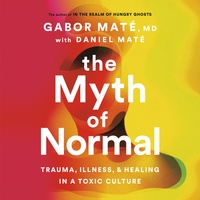Take a photo of a barcode or cover
challenging
dark
emotional
informative
reflective
slow-paced
I loved this book and how well the science of the brain is explained, along with real world examples and some practical advice at the end. Mate is able to talk about difficult subjects and behaviours without judgment and that's huge for me. I also love how this is a collaboration between father and son. This book has really helped me.
It got into a therapy type mode. I was not reading the book to approach therapy. It had become redundant. Critical thinking throughout the book leads you to the same conclusion, thus I do not need my hand held.
informative
slow-paced
I had great expectations for this book but I was quite disappointed. It took me months to finish it and considered DNFing it multiple times but my FOMO took over. The book is much longer than my usual reads too (around 500 pages without references), but I felt that it didn’t have to be that way. The poor organisation of the book and its chapters compromises the overall reading experience and its purpose of bringing the “trauma conversation” to a larger audience. Most of the time the argument gets lost in the hundreds of quotes from interviews, speeches and articles that the authors manage to include —don’t get me wrong, referencing is important but it is not a substitute to actually writing. In short, it felt like reading an unfinished, unedited manuscript rather than a published book. It makes me wonder whether there was any editing and proofreading done at all here. Still, if the reader manages to get through all the facts and quotes mentioned there, I think the book can provide useful and general insights for healthcare professionals lacking any knowledge on trauma-informed care, the politics of health, illness and addiction, Indigenous healing practices, or the body-mind connection explaining the links between childhood trauma and chronic disease and pain in adulthood. However, this is not the book you're looking for if what you need is to dive deeper into the contextual specific meanings, debates and experiences of trauma, chronic illness and healthcare from a clearly defined political and/or philosophical perspective that can actually drive change in collective thinking and action.
informative
reflective
slow-paced
A little long-winded but otherwise an interesting glimpse into how trauma affects both mental and physical health and some approaches to healing.
slow-paced
informative
reflective
medium-paced
This is another read that my therapist recommended in order to continue my journey to understanding and accepting some of my chronic health conditions. I wanted to like this book more, but like other reviewers I found that it lacked depth in many topics and the anecdotes from famous people and others were tiresome, particularly when they were reintroduced over and over (where was the editor on that?). His critiques of the capitalism, etc. were not unique or particularly interesting. I thought Parts I, II, and III were the strongest, with my favourite being part three, which explores afflictions as adaptations. Overall, I think it was a fine book, but it didn't rock my world.
Hard to review. Some aspects of this book are so spot on and there is definitely a link between trauma and chronic illness. At times this book is enthralling and could not be put down. However as the book goes on, he is overly repetitive that it takes away from the message. Some examples he provides are frustrating and dangerous, such as people foregoing obvious and life saving medical care—these are not things we should be normalizing. There are also obvious biases of his in parts as well that also distract and muddy his arguments. There are lessons to be gained from this book, but with a discerning eye.





